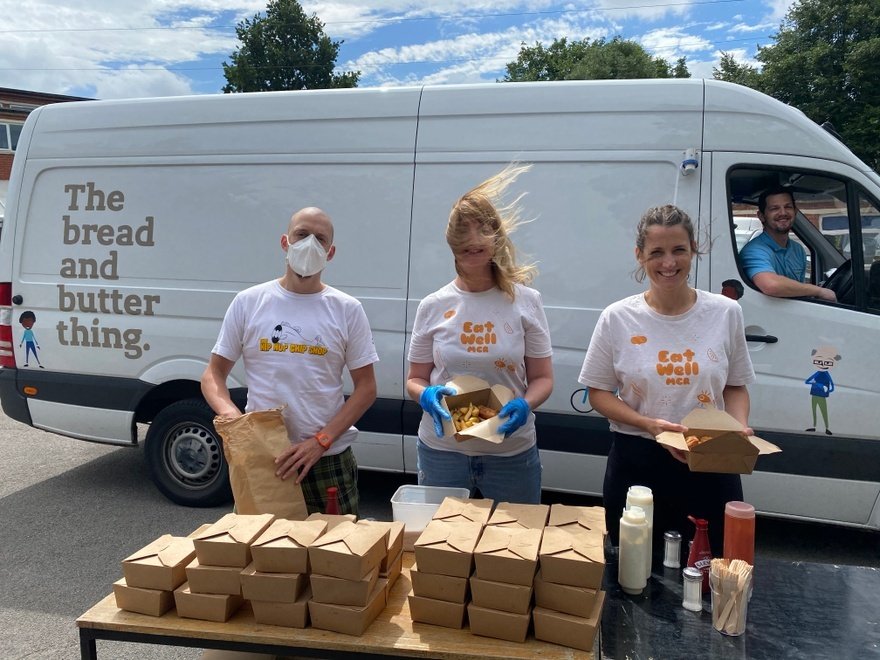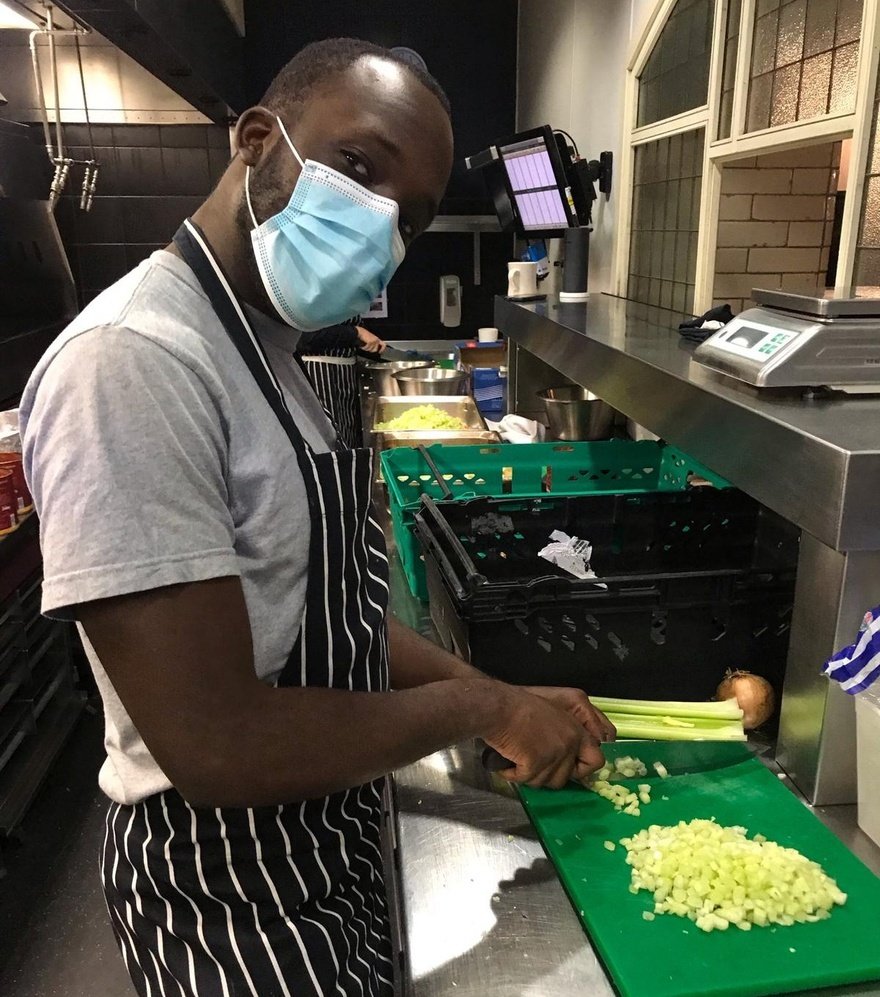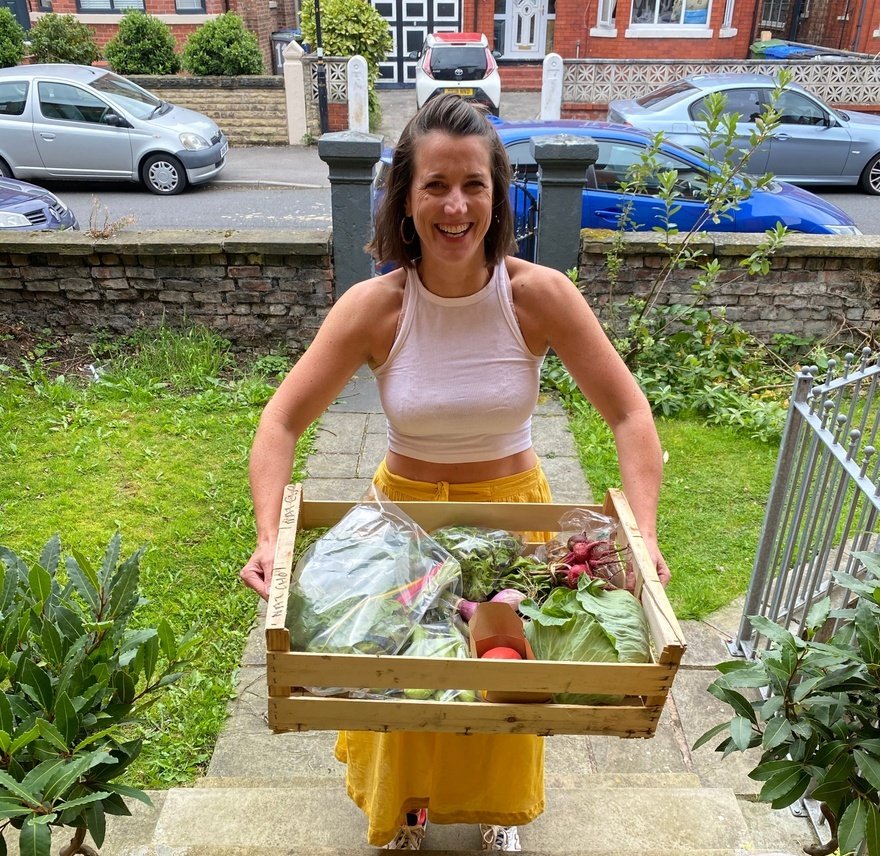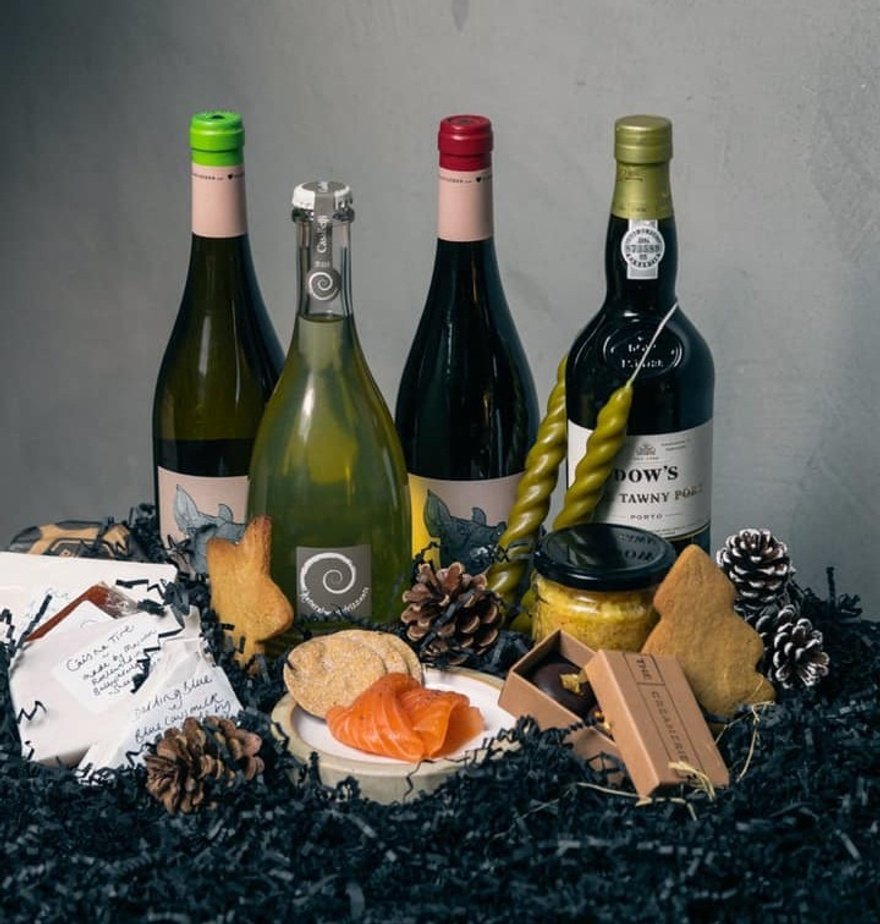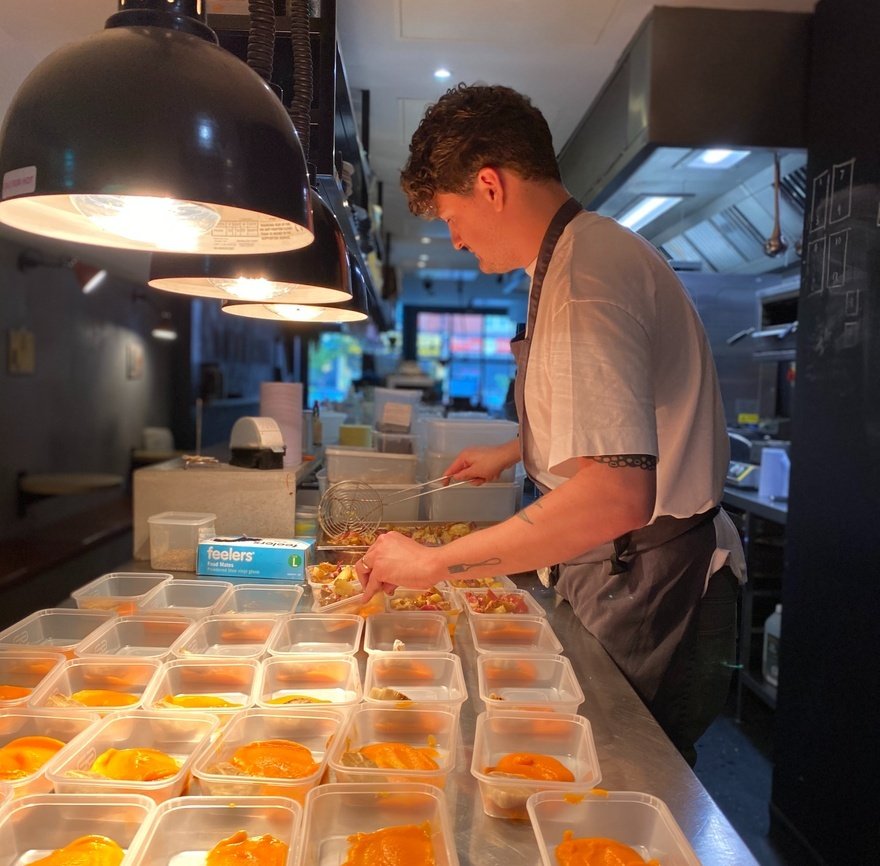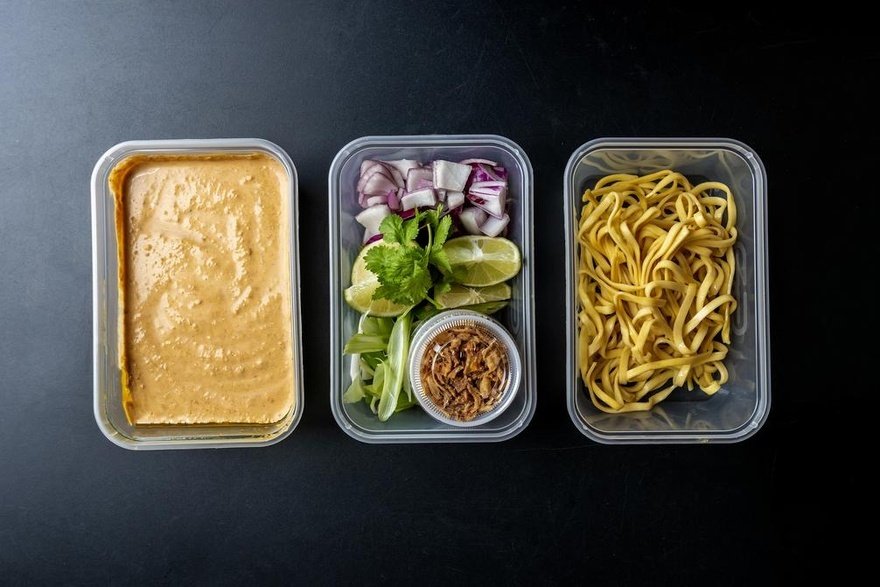Eat Well MCR's Mary-Ellen McTague on tackling food inequality and holiday hunger
The chef and founder of Manchester restaurant the Creameries talks to Lauren Bowes about setting up Eat Well MCR, which has fed 25,000 people since lockdown.
You set up Eat Well MCR in response to the coronavirus pandemic – can you tell us about some of your original aims?
Eat Well MCR came about at the start of the first lockdown. With hospitality businesses suddenly closing, I saw from the situation we were in [at the Creameries] that there was loads of food leftover. I've got a background working for food waste charities, so my first thought was of all the food going into the bin, as it can't be taken to food banks or donated. I put a shout out on Twitter and Instagram and said: "If you've got food, bring it to me, and I'll do what I can to get it to other people." Lots of people responded.
My eldest sister is a doctor and she works in palliative care, and she was talking about how difficult the pandemic was going to be for her teams. It sounded horrendous. I asked what I could do to help, and she said: "Well, you can cook for people; you can take hot meals to people who are working shifts that will last days instead of hours."
I got in touch with a few wards and in the first week I think we did about 50 or 60 meals for Wythenshawe A&E. But there were so many different groups of people who needed feeding – we ended up feeding NHS staff until we phased that out in about July, but then there was demand from other places.
Who else were you delivering food to?
Back on Track, an organisation I was already working with and which I'm a patron of, got in touch with me early on. It was working with the council on the Greater Manchester Emergency Response. Because of lockdown, a lot of rough sleepers were being offered somewhere to isolate in hotels, but their usual routes to food had stopped because there was nobody on the streets and the soup kitchens had closed.
Back on Track asked if I could do 70 meals for one night. It seemed the demand after that was going to be pretty big, so I did another shout out asking if people were willing to help cook. Within a couple of weeks we were doing 500-600 meals a week and had about 120 volunteers.
Paul Jones, who owns Cloudwater Brewery in Manchester, offered us the use of his enormous, football pitch-sized cold room to keep the food in, and an events company lent us 10 chest freezers. We had huge donations of meat and veg, and Paul was buying £500 of veg a week for us from our suppliers.
We want to work with organisations that already exist, which are already addressing an identified need, where we can supplement what they do by adding nutritious meals made by chefs with nice ingredients. We were conscious that there were other organisations in the city that had been working with homeless people and families and women in refuges for years and we didn't want to get in the way or to try to become experts – we just wanted to help where we could.
Now we're focused on working with homeless families and those in temporary accommodation, as well as women in refuge. And we're still growing. We take on more chefs and restaurants every month, and we find more people to feed. I think in total we've done just over 25,000 meals since we started.
When did you realise this was a long-term project, rather than a short-term response to the pandemic?
After a couple of weeks, we felt we needed to formalise, partly because people wanted to give us money and we couldn't really accept donations with no official governance or structure in place. Within about a month we became Eat Well MCR as a formalised CIC [Community Interest Company], rather than just a random gaggle of chefs, restaurant owners and people from all walks of life.
All of these problems existed beforehand. They've become very acute because of the pandemic, but they're going to be here long after. We realised really quickly that it was not a new problem – we were all just suddenly aware of it and had time to do something about it because our businesses were closed.
The need is endless – we are never going to run out of people to feed, which is terrible, but it's true. There's never going to be a shortage of people who are in need, certainly not in the immediate future. We want to tackle food inequality and holiday hunger – but it's not just holiday hunger, it's weekend hunger, it's evening hunger and it's morning hunger.
We want to tackle food inequality and holiday hunger – but it's not just holiday hunger, it's weekend hunger, it's evening hunger and it's morning hunger
What are the different arms of the business?
We call it the ‘shop arm' and the ‘support arm'. My colleague Gemma Saunders runs the ‘support arm', and she has no background in food at all – she's an arts events producer. Gemma finds people who want food and she matches them up with restaurants who are able to cook.
I focus mainly on the Marketplace – the ‘shop arm' – which we launched in October.
What is the Marketplace?
We do meal kits from chefs and restaurants, and we've got people who make pickles, bread and cakes – all sorts of produce. We have local beers, although the wine isn't local (we don't have many vineyards around Manchester). But other than the wine, it's all local. Some of the veg comes from Yorkshire, but most of it comes from Lancashire.
The main aim of the Marketplace is to raise funds to allow us to continue with the support work – that was the founding principle. But our other goals include supporting the local food economy by providing a route to market for small, independent, local food businesses, who, due to the various lockdowns and tier restrictions, haven't been able to open as normal.
Our third goal is that we want it to be a really nice shop – like Not On The High Street, but for food. It's about really high-quality, local produce that you wouldn't be able to get anywhere else.
Your website says one of your aims is to develop long-term strategies to forge links between the hospitality industry and the wider community – why do you think that's important?
One thing that came out of starting Eat Well MCR was this sense of community. Everybody rushed in at the start [of lockdown] to help and was so keen to give their time. People got a lot from it. The chefs' feedback was that they loved doing it; they liked being able to not just feed people who can't afford to go out for dinner, but to also have that connection with the wider community.
When people come out for dinner, you really hope they have a good time, but you also hope that they think you're clever and impressive. That was gone from this – it was just about providing nourishment and enjoyment. There were no egos, there was zero posturing – it just felt like all of the good bits about hospitality. It's not just calories – it's stuff made by chefs, with nice ingredients, with real caretaking.
There were no egos, there was zero posturing – it just felt like all of the good bits about hospitality
It felt really important to all of us involved, and it's something I've believed has needed changing for a really long time: access to the best produce – or just decent produce – is often really restricted for people on low or no income. There are lots of socioeconomic reasons for that. And a lot of people think that nice food isn't for them, because that's what they're told. The message is that unless you're wealthy, you don't get the nice food.
Eat Well MCR was a way of turning that on its head. It felt really positive, both from the point of view of the people cooking and from the recipients. We know it's having a positive impact when we get feedback – the food that we put out generally goes down really well.
We want as many people as possible to be able to take part, because it is a really joyful thing. So long term, we want to make it possible for people to continue helping. When their businesses are back up and running, we can make it as easy as possible for people to keep helping – that is why we deliver the ingredients, the packaging and the labelling, and we collect the meals once they're ready.
We also like to connect people to local projects where we can, so you might have a restaurant that's near a food bank. For example, at the Creameries, we take food once a week to a food bank not far from us. It's really nice – they know us and we know them and we drop the food off and have a chat. It's nice to have that direct relationship with where the food is going.
You mentioned that you're a CIC – do you have plans to become a registered charity?
That's where we want to be, but it's going to take us a while to get there. It's quite a bureaucratic and slow process.
We have four paid members of staff: the Marketplace manager, a driver for both the shop and for the support, and then Gemma and I. Other than that, we have lots of volunteers. We've got a really lovely WhatsApp group, and people will pop up and volunteer when they can. Long term we'd like to develop a proper volunteer programme, but this year has just been such a scramble.
What does the future hold for Eat Well MCR?
For now, we want to build on the Marketplace and make it profitable, so that we've got a steady stream of income for the support work. We're going to have to do some fundraising next year, and we want to build a volunteer programme.
We want a premises with a kitchen, and we want to grow food. We want to run cooking classes for families, where parents and children can learn about food – about where it comes from and some basic cooking techniques. We'd also like to build a model that could be replicated by other people in different towns, cities or villages.
We have a couple of things that we want to pilot soon – one is working with Home-Start, which works with families with children under five. We want to provide food for those families during the first 90 days of a child's life.
How are you finding managing the balance between Eat Well and running a restaurant?
I was already planning on cooking less at the Creameries and splitting my time between the restaurant and Eat Well. I've got somebody really talented moving into the head chef position [Mike Thomas], to take a bit of the pressure off, and we've got an amazing restaurant manager, Emily-Rose Lucas.
Between the two of them, they've massively reduced my workload. But obviously, I've still got a lot of responsibilities there. I could still – and I do currently – easily rack up 80 hours a week and feel like I've not even scratched the surface of my list.
What doesn't help is opening and closing all the time. It's really expensive, because you've got all the admin of closing down and rearranging bookings, and we've got all the food to process so it doesn't get lost. All of that takes staff hours, without any money coming in. And then to reopen again, you've got spend a lot on stock, you've got to clean, prep and get ready. It's very time-consuming. The hardest thing these past few months has been all the chopping and changing. I'm hopeful that at some point this year, things will feel a bit less crazy.
CV
1999-2001 From commis chef to chef de partie, Sharrow Bay, Penrith, Cumbria
2002-2006 Sous chef, the Fat Duck, Bray, Berkshire
2007-2009 Ramsons, Ramsbottom
2009-2014 Chef-proprietor, Aumbry, Prestwich
2014-2016 Ran pop-ups at Manchester's Central Library, the Anthony Burgess Foundation and for the Manchester International Festival
2016-2017 Head chef Real Junk Food Project Manchester
2017-2018 Executive chef, Manchester Art Gallery
April 2018-present Chef-proprietor, the Creameries, Chorlton, Manchester
April 2020-present Founder/managing director, Eat Well MCR
The Eat Well MCR team
Managing directors Mary-Ellen McTague and Gemma Saunders
Non-executive directors Richard Carver, David Fox, Paul Jones
Marketing director Kathleen O'Connor
PR Lucy Noone, Pear
Social media management India Morris
Marketplace manager Chris Drury
Driver Owen Parker
Continue reading
You need to be a premium member to view this. Subscribe from just 99p per week.
Already subscribed? Log In



